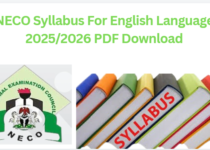NECO Syllabus For Civic Education 2025/2026
The NECO Syllabus For Civic Education 2025/2026 exams are approaching, and preparing with the right materials is crucial. The official syllabus is essential, as it outlines all the topics covered in the exam, helping students avoid wasting time on irrelevant content.
The NECO Board has designed a detailed syllabus for Civic Education and other subjects, guiding candidates on what to focus on. If you haven’t started using it yet, now is the time to access the NECO Civic Education syllabus in PDF format to ensure you’re fully prepared.
Contents
NECO Syllabus For Civic Education 2025/2026
The NECO Civic Education exam consists of two main parts: Paper 1 (Multiple Choice) and Paper 2 (Essay Questions). Paper 1 includes 50 multiple-choice questions, which you must complete in 1 hour.
The section is worth 40 marks and tests a broad range of topics from the syllabus, with each question having several answer choices, from which you must select the correct one.
Paper 2 is a 2-hour written exam divided into three sections. Section A focuses on national ethics, discipline, rights, and responsibilities, while Section B addresses emerging societal issues such as environmental concerns and social justice.
Section C covers government systems and processes. In this section, you must answer four questions in total, choosing at least one from each of the three sections. Paper 2 is worth 60 marks. This structure is designed to test a wide understanding of civic education, covering societal, ethical, and governance issues.
NECO Syllabus For Civic Education Examinations 2025/2025
The NECO Civic Education Examination 2024 syllabus provides a comprehensive guide for candidates to prepare effectively. It outlines key topics, including national ethics, discipline, rights, societal issues, and government systems, to be covered in both Paper 1 (Multiple Choice) and Paper 2 (Essay Questions). Candidates should use this syllabus to focus their study and ensure a thorough understanding of the required content.
| SN | TOPIC | OBJECTIVES |
|---|---|---|
| 1 | Values | 1.1 Definition, 1.2 Types, 1.3 Importance to society |
| 2 | Citizenship and Nationalism | 2.1 Meaning of citizenship, 2.2 Citizenship education, 2.3 Goals, 2.4 Duties & obligations, 2.5 Nationalism, 2.6 Promoting unity, 2.7 Nationalistic roles, 2.8 Identifying civic problems |
| 3 | Human Rights | 3.1 Meaning, 3.2 Categories, 3.3 Characteristics, 3.4 UDHR history, 3.5 Core freedoms, 3.6 Importance, 3.7 Roles in UDHR, 3.8 Limitations to human rights |
| 4 | Law and Order | 4.1 Definition, 4.2 Features, 4.3 Importance, 4.4 Constituted authority, 4.5 Types, 4.6 Roles of authority |
| 5 | Responsible Parenthood | 5.1 Meaning, 5.2 Roles of parents, 5.3 Importance in national development |
| 6 | Traffic Regulations | 6.1 Meaning, 6.2 Importance, 6.3 Roles of individuals & government |
| 7 | Interpersonal Relationships | 7.1 Meaning, 7.2 Types, 7.3 Skills promoting relationships, 7.4 Inter-communal relationships, 7.5 Importance, 7.6 Inter-communal conflicts, 7.7 Skills for conflict resolution |
| 8 | Cultism | 8.1 Meaning & origin, 8.2 Cult groups & symbols, 8.3 Reasons, 8.4 Consequences, 8.5 Prevention |
| 9 | Drugs and Drug Abuse | 9.1 Meaning, 9.2 Abusable drugs, 9.3 How drugs are abused, 9.4 Symptoms, 9.5 Addict behaviors, 9.6 Prevention, 9.7 Agencies & laws |
| 10 | Human Trafficking | 10.1 Meaning, 10.2 Causes, 10.3 Effects, 10.4 Efforts to stop trafficking |
| 11 | HIV/AIDS | 11.1 Meaning, 11.2 Causes, 11.3 Symptoms & effects, 11.4 Prevention, 11.5 Stigmatization |
| 12 | Youth Empowerment | 12.1 Meaning, 12.2 Empowerment skills, 12.3 Importance, 12.4 Government efforts |
| 13 | Structure and Functions of Government | 13.1 Meaning, 13.2 Structure/tiers, 13.3 Functions |
| 14 | Democracy, Rule of Law, and National Development | 14.1 Meaning, types, & features of democracy, 14.2 Importance, 14.3 Pillars, 14.4 Problems, 14.5 Rule of law, 14.6 Features, 14.7 Importance, 14.8 Problems, 14.9 National development, 14.10 Impact of democracy & rule of law |
| 15 | Political Apathy | 15.1 Meaning, 15.2 Causes, 15.3 Consequences, 15.4 Leaders’ roles, 15.5 Ways to discourage apathy |
| 16 | Civil Society and Popular Participation | 16.1 Meaning, 16.2 Types, 16.3 Need, 16.4 Traditional & modern modes, 16.5 Achieving participation, 16.6 Meaning of civil society, 16.7 Functions, 16.8 Qualities, 16.9 Problems |
| 17 | Public Service in Democracy | 17.1 Meaning, 17.2 Functions, 17.3 Problems, 17.4 Reasons for shortcomings, 17.5 Improvements |
Study Tips To pass Neco Civic Education Examinations in 2025
The NECO syllabus is an essential guide, listing all the topics and objectives you need to study. Focus on the topics included in the syllabus and prioritize those you find challenging.
To prepare effectively, practice with NECO past questions to understand the exam format, common question patterns, and phrasing. Answer as many past questions as possible to build confidence and improve speed, ensuring your answers align with the syllabus content.
Divide your study time across all topics and use past essay questions to practice structuring your answers, especially on definitions and concepts. We hope this article was helpful—feel free to ask any questions in the comments!
Neco Recommended Textbooks for Civic Education 2025/2026
| NECO RECOMMENDED TEXT BOOKS FOR CIVIC EDUCATION | AUTHOR | PUBLISHER |
| Comprehensive Civic Education for SSS | Meneke Obiageri & Nwebo | Milestone Publishers. |
| Civic Education for SSS 1 – 3 | Dimgbaobas D. | Melrose Pubs |
| New Millenium Civic Education | S.I. Onuoha | Chin & Chris Res LTD |
Frequently Asked Questions (FAQs
The syllabus is available on the official NECO website or through your school.
Topics include citizenship, government, democracy, human rights, and civic responsibilities.


